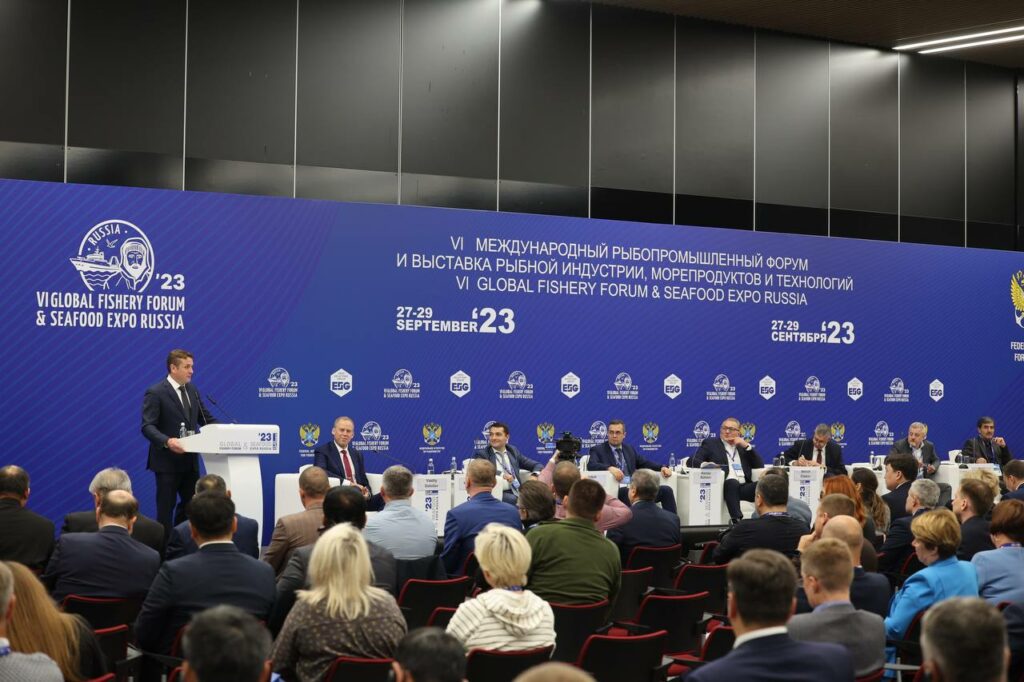The volume of aquaculture production in the Eurasian Economic Union (EAEU) increased 1.8-fold between 2017 and 2022. Russia is the leader in production volume. The growth dynamics and constraints were discussed at the conference ‘Development of Aquaculture within the Common Economic Space. Challenges and Solutions’.
Ilya Shestakov, Head of the Federal Agency for Fisheries, opened this key event of Day 2 of VI Global Fishery Forum & Seafood Expo Russia.
“The most recent FAO data show that total catch and aquaculture production volumes have reached 214 million tonnes worldwide, with aquaculture contributing 122.6 million tonnes to total fish product manufacturing. This raises the question: what is more important now in terms of fish product manufacture – fishery or aquaculture? Though fishery is, of course, a social pattern crucial for the development of coastal areas,” said Ilya Shestakov.
The Head of the Federal Agency for Fisheries pointed out that aquaculture production has grown in Russia over the past decade, in line with the global trend. The Agency estimates that the aquaculture volume will exceed 40 thousand tonnes in 2023.
“In terms of catch volumes, this is still a small figure for Russia. But we are working hard to increase it. The progressive expansion gives us reason to say that, at a very minimum, we will meet the expected metrics of the fishery development strategy with pin-point accuracy. By 2030, aquaculture production in our country should reach 600 thousand tonnes”, Ilya Shestakov said.
He also noted a positive trend: holding companies and big agricultural businesses that used to focus only on agriculture are now starting to join the sector, which means they see an investment potential in aquaculture.
During the conference, experts, including guests from friendly countries, shared their experience and achievements in this important area, exchanging proposals for continued expansion of aquaculture production.
Conference moderator Vasily Sokolov, Deputy Head of the Federal Agency for Fisheries, mentioned the fast-paced transition to industrial-grade farming technologies that will shape the industry’s future.
"They provide for the dramatic growth we have seen in recent years. At the same time, Russian and global experience shows that intensive development of aquaculture must take into account the health of the aquatic environment, health of the farming stock, nutritional value and safety of the products. These are all new challenges this booming sector has for us,” Vasily Sokolov emphasized.
Armen Harutyunyan, Agricultural Policy Department Director, Eurasian Economic Commission (EEC), spoke about the opportunities for aquaculture development in Eurasia.
“All countries have several government projects for stimulating production but we should also pay attention to building an overall culture of fish and seafood consumption. This has a great potential for promoting a healthy lifestyle and developing local manufacturing,” said the EEC representative.
Critical tasks include ensuring food security and harmonizing rules and regulatory frameworks in order to increase mutual trade and exports.
The EEC Department Director also announced that a special aquaculture programme will be launched for the member countries in 1Q 2024.
Artem Daushev, Assistant to the Head of Rosselkhoznadzor, reported on the signing of a protocol with China’s General Customs Administration on expanding the list of fish products that could be supplied from Russia to China. He also spoke about the development of digitalization to ensure traceability of fish products.
“Russian laws prescribe that identification of fish and other aquaculture fish assets must be completed by 1 March 2026 at the latest. Appropriate functions for this are fully available in the Horriot information system operated by Rosselkhoznadzor. We can already start entering relevant data long before the deadline in order to enjoy all the benefits of the traceability system based on real data,” he said.
Vladimir Rumyantsev, Development Director at TsRT, spoke about the development of an industry platform ecosystem for the aquaculture market in partnership with the Federal Agency for Fisheries. “This takes some time because we need to coordinate a host of interconnected business processes, regulatory standards and rules, and bring them into alignment with one another. The project will gradually unfold over the next two years, allowing us to trace all chains, significantly reduce transaction costs for industry players and focus on fish farming instead of bureaucracy”, he explained.
Mikhail Glazkov, Deputy Governor of the Vologda Region, shared his experience in developing aquaculture in the Region, which is currently running Russia’s biggest project with recirculating aquaculture system technologies.
"We have been able to increase aquaculture production in the Region by a factor of 12. 15 enterprises have already started fish breeding and 13 more companies have registered and are ready to begin operations very soon,” said Mikhail Glazkov.
Other participants in the discussion included Ilya Solodukhin, Head of the Big Business Department at Russian Agricultural Bank, Korney Bizhdov, President of the National Association of Agricultural Insurers, Omonjan Musayev, Chairman of the Uzbekbaliksanoat Association (Republic of Uzbekistan), Nariman Zhunusov, Chairman of the Fisheries Committee of the Ministry of Ecology, Geology and Natural Resources of the Republic of Kazakhstan, Ibrahiem Salih A Alzahrani, Director of the Aquaculture, National Livestock and Fisheries Development Programme, Kingdom of Saudi Arabia, and Mehdi Shakouri, Deputy Head of the Fisheries Organization, Ministry of Agricultural Jihad (Development), Islamic Republic of Iran.
In conclusion, Vasily Sokolov said that all countries are demonstrating positive dynamics in aquaculture production but they all have common problems holding back growth. “The world is seeking to divide up in many areas, but we need to join efforts when it comes to aquaculture because this is one of the most promising areas,” Mr. Sokolov stressed.


